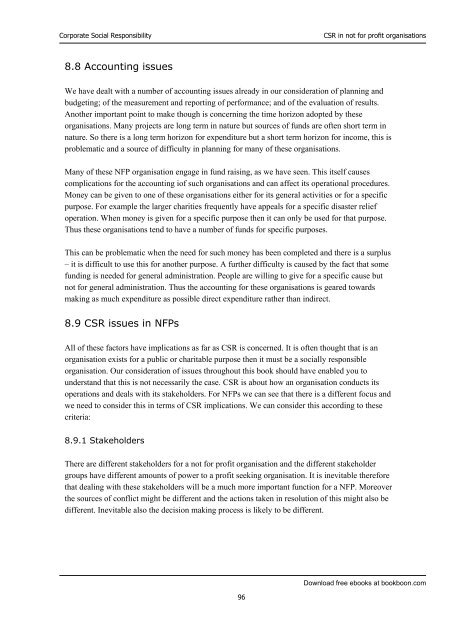Defining Corporate Social Responsibility - Tutorsindia
Defining Corporate Social Responsibility - Tutorsindia
Defining Corporate Social Responsibility - Tutorsindia
You also want an ePaper? Increase the reach of your titles
YUMPU automatically turns print PDFs into web optimized ePapers that Google loves.
<strong>Corporate</strong> <strong>Social</strong> <strong>Responsibility</strong><br />
CSR in not for profit organisations<br />
8.8 Accounting issues<br />
We have dealt with a number of accounting issues already in our consideration of planning and<br />
budgeting; of the measurement and reporting of performance; and of the evaluation of results.<br />
Another important point to make though is concerning the time horizon adopted by these<br />
organisations. Many projects are long term in nature but sources of funds are often short term in<br />
nature. So there is a long term horizon for expenditure but a short term horizon for income, this is<br />
problematic and a source of difficulty in planning for many of these organisations.<br />
Many of these NFP organisation engage in fund raising, as we have seen. This itself causes<br />
complications for the accounting iof such organisations and can affect its operational procedures.<br />
Money can be given to one of these organisations either for its general activities or for a specific<br />
purpose. For example the larger charities frequently have appeals for a specific disaster relief<br />
operation. When money is given for a specific purpose then it can only be used for that purpose.<br />
Thus these organisations tend to have a number of funds for specific purposes.<br />
This can be problematic when the need for such money has been completed and there is a surplus<br />
– it is difficult to use this for another purpose. A further difficulty is caused by the fact that some<br />
funding is needed for general administration. People are willing to give for a specific cause but<br />
not for general administration. Thus the accounting for these organisations is geared towards<br />
making as much expenditure as possible direct expenditure rather than indirect.<br />
8.9 CSR issues in NFPs<br />
All of these factors have implications as far as CSR is concerned. It is often thought that is an<br />
organisation exists for a public or charitable purpose then it must be a socially responsible<br />
organisation. Our consideration of issues throughout this book should have enabled you to<br />
understand that this is not necessarily the case. CSR is about how an organisation conducts its<br />
operations and deals with its stakeholders. For NFPs we can see that there is a different focus and<br />
we need to consider this in terms of CSR implications. We can consider this according to these<br />
criteria:<br />
8.9.1 Stakeholders<br />
There are different stakeholders for a not for profit organisation and the different stakeholder<br />
groups have different amounts of power to a profit seeking organisation. It is inevitable therefore<br />
that dealing with these stakeholders will be a much more important function for a NFP. Moreover<br />
the sources of conflict might be different and the actions taken in resolution of this might also be<br />
different. Inevitable also the decision making process is likely to be different.<br />
96<br />
Download free ebooks at bookboon.com
















